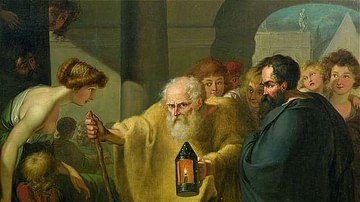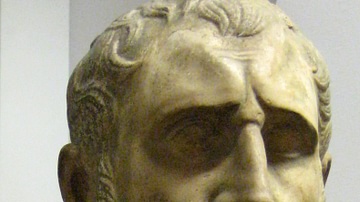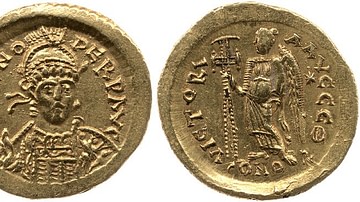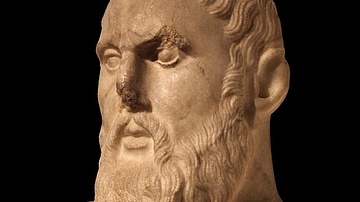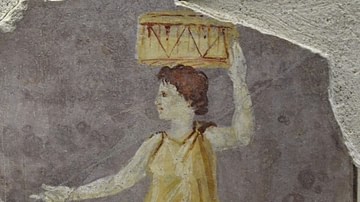Crates of Thebes (l. c. 360-280 BCE) was one of the most important Cynic philosophers of ancient Greece. He was born to a wealthy family in Thebes but gave away his inheritance after realizing the futility of material possessions and the shallow values espoused by society.
After renouncing his personal wealth, he moved to Athens where he studied philosophy with Diogenes of Sinope (l. c. 404-323 BCE), the famous Cynic philosopher. Following Diogenes, Crates lived on the streets of Athens, owned nothing, and lived his philosophy very publicly. He believed one should strive to be free in all things and master oneself and one's own problems before worrying about others and their perceived problems.
He was known to never drink wine or any intoxicant, but only water, and to eat only what was necessary to live, but never to excess. In summer he wore a winter cloak to teach himself to bear adversity in the body, and in winter, only rags for the same reason.
His most famous student was Zeno of Citium (l. c. 336-265 BCE), who founded the Stoic School of philosophy, which would later have a profound impact on the culture of Rome and later cultures and civilizations by emphasizing endurance, non-violence, the primacy of reason, and the pleasure to be found in living simply.
The historian Diogenes Laertius (l. c. 180 - c. 240 CE), who wrote on the lives of many Greek philosophers, also devoted a chapter to Crates. He claims that Crates was known as "the door opener" because he would regularly walk into people's houses to give them counsel, uninvited, and then leave when the situation was resolved. He was a physically unattractive man but had such a good spirit and was always so cheerful that the people of Athens welcomed him into their homes.
In fact, besides "the door opener" he was also known as "the good spirit" and would help anyone in need, even if they did not realize at the time that they needed his help. He died on the streets of Athens, an old man, and his philosophical school may have then been run by his wife Hipparchia. His example of living his beliefs fully, and his teachings, would influence countless generations after him through the works of Zeno of Citium.
The following passages come from Diogenes Laertius' work, The Lives and Opinions of Eminent Philosophers. The translation is by C.D. Yonge.
I. CRATES was a Theban by birth, and the son of Ascondus. He also was one of the eminent disciples of the Cynic. But Hippobotus asserts that he was not a pupil of Diogenes, but of Bryson the Achaean.
II. There are the following sportive lines of his quoted:
The waves surround vain Peres' fruitful soil,
And fertile acres crown the sea-born isle;
Land which no parasite e'er dares invade,
Or lewd seducer of a hapless maid;
It bears figs, bread, thyme, garlic's savoury charms,
Gifts which ne'er tempt men to detested arms,
They'd rather fight for gold than glory's dreams.There is also an account-book of his much spoken of, which is drawn up in such terms as these:
Put down the cook for minas half a score,
Put down the doctor for a drachma more:
Five talents to the flatterer; some smoke
To the adviser, an obol and a cloak
For the philosopher; for the willing nymph,
A talent...He was also nicknamed Door-opener, because he used to enter every house and give the inmates advice. These lines, too, are his:
All this I learnt and pondered in my mind,
Drawing deep wisdom from the Muses kind,
But all the rest is vanity.There is a line, too, which tells us that he gained from philosophy:-
A peck of lupins, and to care for nobody.
This, too, is attributed to him:
Hunger checks love; and should it not, time does.
If both should fail you, then a halter choose.III. He flourished about the hundred and thirteenth Olympiad.
IV. Antisthenes, in his Successions, says that he, having once, in a certain tragedy, seen Telephus holding a date basket, and in a miserable plight in other respects, betook himself to the Cynic philosophy; and having turned his patrimony into money (for he was of illustrious extraction), he collected three hundred talents by that means, and divided them among the citizens. And after that he devoted himself to philosophy with such eagerness, that even
Philemon the comic poet mentions him. Accordingly he says:
And in the summer he'd a shaggy gown,
To inure himself to hardship: in the winter
He wore mere rags.But Diocles says that it was Diogenes who persuaded him to discard all his estate and his flocks, and to throw his money into the sea; and he says further, that the house of Crates was destroyed by Alexander, and that of Hipparchia under Philip. And he would very frequently drive away with his staff those of his relations who came after him, and endeavoured to dissuade him from his design; and he remained immoveable.
V. Demetrius, the Magnesian, relates that he deposited his money with a banker, making an agreement with him, that if his sons turned out ordinary ignorant people, he was then to restore it to them; but if they became philosophers, then he was to divide it among the people, for that they, if they were philosophers, would have no need of anything. And Eratosthenes tells us that he had by Hipparchia, whom we shall mention hereafter, a son whose name was Pasicles, and that when he grew up, he took him to a brothel kept by a female slave, and told him that that was all the marriage that his father designed for him; but that marriages which resulted in adultery were themes for tragedians, and had exile and bloodshed for their prizes; and the marriages of those who lived with courtesans were subjects for the comic poets, and often produced madness as the result of debauchery and drunkenness.
VI. He had also a brother named Pasicles, a pupil of Euclides.
VII. Favorinus, in the second book of his Commentaries, relates a witty saying of his; for he says, that once, when he was begging a favour of the master of a gymnasium, on the behalf of some acquaintance, he touched his thighs; and as he expressed his indignation at this, he said, "Why, do they not belong to you as well as your knees?" He used to say that it was impossible to find a man who had never done wrong, in the same way as there was always some worthless seed in a pomegranate. On one occasion he provoked Nicodromus, the harp-player, and received a black eye from him; so he put a plaster on his forehead and wrote upon it, "Nicodromus did this." He used to abuse prostitutes designedly, for the purpose of practising himself in enduring reproaches. When Demetrius Phalereus sent him some loaves and wine, he attacked him for his present, saying, "I wish that the fountains bore loaves;" and it is notorious that he was a water drinker.
He was once reproved by the aediles of the Athenians, for wearing fine linen, and so he replied, "I will show you Theophrastus also clad in fine linen." And as they did not believe him, he took them to a barber's shop, and showed him to them as he was being shaved. At Thebes he was once scourged by the master of the Gymnasium, (though some say it was by Euthycrates, at Corinth), and dragged out by the feet; but he did not care, and quoted the line :
I feel, O mighty chief, your matchless might,
Dragged, foot first, downward from th' ethereal height.(a parody on Homer. Il. 1.591. Pope's Version, 760)
But Diocles says that it was by Menedemus, of Eretria, that he was dragged in this manner, for that as he was a handsome man, and supposed to be very obsequious to Asclepiades, the Phliasian, Crates touched his thighs and said, "Is Asclepiades within?" And Menedemus was very much offended, and dragged him out, as has been already said; and then Crates quoted the above-cited line.
VIII. Zeno, the Cittiaean, in his Apophthegms, says, that he once sewed up a sheep's fleece in his cloak, without thinking of it; and he was a very ugly man, and one who excited laughter when he was taking exercise. And he used to say, when he put up his hands, "Courage, Crates, as far as your eyes and the rest of your body is concerned:
IX. "For you shall see those who now ridicule you, convulsed with disease, and envying your happiness, and accusing themselves of slothfulness." One of his sayings was, "That a man ought to study philosophy up to the point of looking on generals and donkey-drivers in the same light." Another was, that those who live with flatterers, are as desolate as calves when in the company of wolves; for that neither the one nor the other are with those whom they ought to be, or their own kindred, but only with those who are plotting against them.
X. When he felt that he was dying, he made verses on himself, saying:
You're going, noble hunchback, you are going
To Pluto's realms, bent double by old age.For he was humpbacked from age.
XI. When Alexander asked him whether he wished to see the restoration of his country, he said, "What would be the use of it? for perhaps some other Alexander would come at some future time and destroy it again.
But poverty and dear obscurity,
Are what a prudent man should think his country;
For these e'en fortune can't deprive him of.He also said that he was:
A fellow countryman of wise Diogenes,
Whom even envy never had attacked.Menander, in his Twin-Sister, mentions him thus:
For you will walk with me wrapped in your cloak,
As his wife used to with the Cynic Crates.XII. He gave his daughter to his pupils, as he himself used to say -
To have and keep on trial for a month.
***
There is also a volume of letters of Crates extant, in which he philosophizes most excellently; and in style is very little inferior to Plato. He also wrote some tragedies, which are imbued with a very sublime spirit of philosophy, of which the following lines are a specimen:
'Tis not one town, nor one poor single house,
That is my country; but in every land
Each city and each dwelling seems to me,
A place for my reception ready made.And he died at a great age, and was buried in Boeotia.
Author's Note: Grateful Acknowledgment to Peitho's Web site for their generous translation of Diogenes Laertius: http://classicpersuasion.org/pw/diogenes/
![Crates of Thebes [Painting]](https://www.worldhistory.org/img/r/p/500x600/2913.jpg?v=1732987687)
